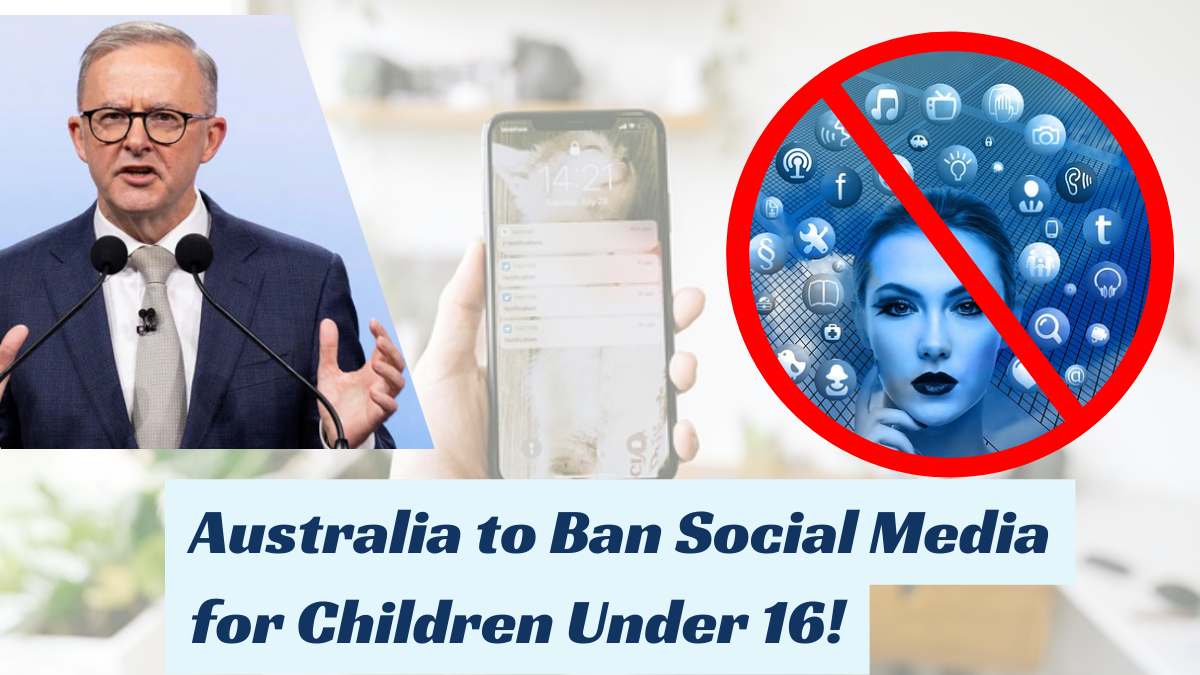Australia is taking significant steps to safeguard the mental health and well-being of young Australians by proposing a social media ban for children under the age of 16. This legislation, announced by Prime Minister Anthony Albanese, aims to address the rising concerns about the negative effects of social media, such as cyberbullying and mental health challenges.
With age verification trials underway, the initiative reflects a broader commitment to promoting healthier online interactions while emphasizing the importance of parental guidance and education. Here’s everything parents and educators need to know about this proposed legislation, its implications, and how to navigate the digital landscape for children.

Understanding the Context
Social media has become an integral part of modern life, but its impact on children has raised alarm worldwide. Research by the Australian Institute of Health and Welfare (AIHW) reveals that one in seven children aged 4 to 17 experiences mental health issues, with social media often exacerbating conditions like anxiety, depression, and low self-esteem.
The COVID-19 pandemic further highlighted these concerns, as children increasingly turned to digital platforms for communication and entertainment. While social media offers opportunities for creativity and connection, it also exposes young users to cyberbullying, unrealistic comparisons, and other risks that can negatively affect their mental health.
The Proposed Legislation
The Australian government is set to introduce legislation by the end of 2024 to enforce a minimum age limit of 16 years for social media usage. This law aims to:
- Reduce the mental health risks associated with excessive social media use.
- Protect children from harmful online content and interactions.
- Encourage healthier, offline activities.
Age Verification Technologies
To enforce the ban, the government is trialing age verification technologies that could include:
- Biometric verification: Using AI to estimate age through facial recognition.
- Official identification: Requiring users to submit identification documents for verification.
While these methods aim to ensure compliance, concerns about data privacy and potential misuse of personal information have been raised. Experts emphasize the need for robust safeguards to protect user data.
Expert Opinions
Support for the Ban
Dr. Hannah Clarke, a child psychologist, states:
“Limiting social media access for children under 16 is a proactive step toward protecting their mental health. Studies consistently show that excessive use can lead to emotional and psychological challenges.”
Concerns About Effectiveness
John Smith, a social media analyst, suggests:
“An outright ban might drive children to use unregulated platforms, exposing them to even greater risks. Education and open dialogue are crucial in fostering safe online habits.”
Practical Advice for Parents and Educators
Parents and educators have a critical role in supporting children as they navigate the digital world. Here are some actionable strategies:
Educate About Safe Social Media Use
- Teach children about online privacy, recognizing harmful content, and the importance of responsible sharing.
- Encourage critical thinking when engaging with online material.
Set Boundaries and Rules
- Establish clear rules regarding screen time and permissible platforms.
- Use tools like parental controls to monitor usage without infringing on children’s independence.
Encourage Offline Activities
- Promote hobbies such as sports, arts, and outdoor adventures to balance screen time.
- Highlight the benefits of real-world connections and experiences.
Lead by Example
- Model healthy social media habits. Children are more likely to adopt responsible behaviors when they see adults practicing them.
Stay Informed
- Keep up to date with the latest developments in legislation and digital safety practices.
- Participate in community discussions and school programs addressing online safety.
Addressing Concerns About the Ban
Will the Ban Be Effective?
Critics worry that children might bypass restrictions by lying about their age or using alternative platforms. To address this, the government must combine enforcement with education to instill responsible online behaviors.
How Will Privacy Be Protected?
Privacy concerns surrounding age verification technologies are valid. Transparent policies and secure data handling practices will be essential to gaining public trust.
What About Educational Content?
While the ban targets social media, educational tools and platforms remain accessible. Parents and educators must differentiate between harmful and beneficial digital content.
The Role of Parents and Educators
Parents and educators can help shape the impact of this legislation by fostering open communication, providing guidance, and promoting a balanced approach to technology use. As Prime Minister Anthony Albanese noted, “We want to see kids off their devices and onto the footy fields, swimming pools, and tennis courts.”
Frequently Asked Questions
Why is Australia banning social media for children under 16?
The ban aims to protect young Australians from the mental health risks associated with excessive social media use, including anxiety, depression, and cyberbullying.
How will the ban be enforced?
The government is trialing age verification technologies such as biometric verification and ID-based systems to ensure compliance.
What are the privacy concerns with age verification?
Data privacy is a significant concern. The government must implement secure systems to protect personal information and ensure transparency in data handling.
Can children access educational tools online?
Yes, the ban targets social media platforms, not educational or learning-focused tools, which remain accessible.
How can parents support this initiative?
Parents can educate children about safe online behaviors, set screen time boundaries, and encourage offline activities to foster a balanced lifestyle.
What happens if children bypass the ban?
The government will need to address loopholes and strengthen measures to minimize circumvention while emphasizing education to prevent misuse.
When will the legislation take effect?
The government plans to introduce the legislation by the end of 2024, following trials of age verification technologies.
Click here to know more.
A passionate content writer specializing in creating engaging, SEO-optimized content. With expertise in blogs, web copy, and storytelling, I craft words that connect with audiences and deliver results.
